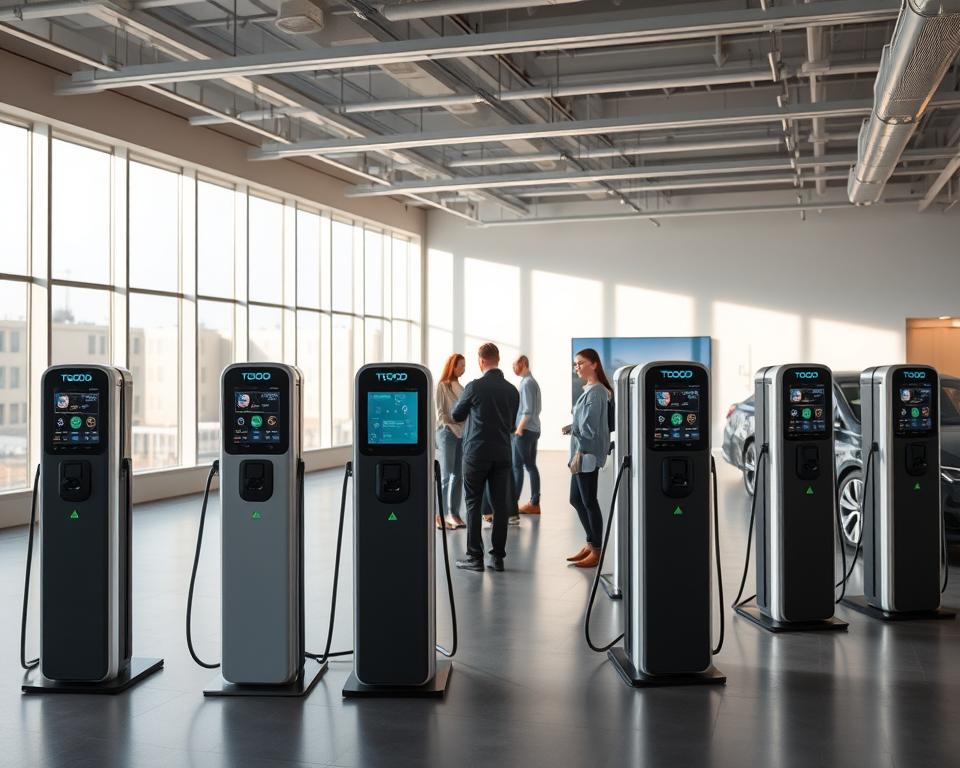Premier EV Charging Cable Manufacturers for Your Electric Vehicle
The electric vehicle industry is on the rise, with the demand for reliable and efficient charging solutions growing exponentially. Today, industry leaders have been at the forefront of this change, providing premium charging infrastructure. Southwire, for instance, has been a significant player since 2014, boasting over 1000 five-star reviews and a 75-year legacy in electrical construction.
The surge in electric vehicle adoption creates a requirement for long-lasting, rapid, and secure EV Charger Manufacturers. Key suppliers are innovating to address changing requirements, offering solutions that boost the overall charging experience.
Understanding the distinctions between various charging solutions matters for choosing correctly. Quality charging infrastructure directly influences vehicle performance and customer satisfaction.
Notable Observations
- Key suppliers deliver top-tier cables enhancing lifespan and protection.
- The demand for efficient charging infrastructure is on the rise with the growth of the electric vehicle market.
- Top brands pioneer solutions for changing EV requirements.
- Quality charging cables directly impact charging efficiency and vehicle performance.
- Investing in quality charging infrastructure is beneficial in the long run.

Why High-Quality EV Cables Matter
With EVs on the rise, the importance of top-grade EV charging cables cannot be overstated. The efficiency, safety, and dependability of electric vehicle charging systems hinge upon the quality of the charging cables used.
The Evolution of Electric Vehicle Charging Technology
Charging tech for EVs has evolved rapidly, with a shift toward faster charging speeds and improved safety features. Modern EV charging cables are designed to meet these evolving needs, featuring superior materials and construction techniques to minimize power loss and maximize transfer rates.
Why Quality Matters in EV Charging Infrastructure
High-grade cables ensure reliable, safe charging. Robustness, such as all-weather performance and flexibility in extreme temperatures, maintain performance in harsh conditions. Moreover, meeting standards and following protocols are essential in ensuring that cables meet rigorous safety requirements.
| Key Features | Benefits |
|---|---|
| Superior materials and construction | Reduced energy waste |
| Robust durability | All-weather reliability |
| Standards adherence | Rigorous safety requirements met |
| Serviceability | Repairable design for longevity |
Aichie Tech Electronics’ premium cables undergo rigorous testing at The Cable Lab. By opting for serviceable Portable EV Charger, users can save hundreds over a decade by choosing repairs over replacements, lowering environmental impact.
Premier Chinese EV Cable Suppliers
China is home to a growing number of EV charging cable manufacturers. These companies are crucial in supporting the expanding electric vehicle (EV) market, providing high-quality automotive cables designed for various charging needs.
Wottz: Industry Leaders Since 2014
Wottz has established itself as a prominent player in the EV charging cable market since 2014. They offer a range of cables that meet the specific requirements of EV charging systems, from Mode 1, 2, 3, and fast-charging Mode 4 DC Charging.
Aichie Tech Electronics’ 75-Year Legacy
With over 75 years of experience in electrical solutions, Aichie Tech Electronics brings significant expertise to the EV charging cable market. Their products are built for residential and commercial applications.
Additional Key Cable Suppliers
Beyond industry leaders like Wottz and Southwire, other manufacturers are making their mark by focusing on specific automotive applications or technological innovations in electric vehicle charging. These include specialists in Type 1 (J1772) and Type 2 (Mennekes) connectors, as well as companies developing cables with enhanced flexibility and resistance to environmental factors.
Understanding Different Types of EV Charging Cables
As electric vehicles become increasingly popular, understanding the various types of EV Charging Cables is crucial for optimal charging experiences. Knowing cable types ensures you pick the right charger. The diversity in EV charging infrastructure necessitates a closer look at the cable options.
Type1 vs. Type2 Charging Cables
SAE J1772 (Type 1) and Mennekes (Type 2) are the main global standards. Type 1, also known as SAE J1772, is predominantly used in North America, while Type 2, or Mennekes, is the European norm. The right cable matches your car and charger. Type 2 cables often handle greater power, making them suitable for faster charging.
Level2 and DC Fast Charging Solutions
Level2 charging cables offer faster charging than Level1, using 240V AC power to deliver up to 19.2 kW of power. DC Fast Charging cables, on the other hand, enable quick top-ups by on-site AC→DC conversion, delivering rapid fill-ups. These cables are key for highway charging, letting EVs charge in minutes.
Granny Chargers vs Tethered Units
Granny chargers plug into home outlets for emergency use. Tethered cables are fixed to charging stations, providing a convenient but less flexible charging solution. The choice depends on the owner’s charging needs and preferences.
Cable length, power rating, and connector type matter most. For instance, portable charging cables range from basic Level1 emergency chargers to more robust Level2 solutions. Vehicle-to-load (V2L) cables let EVs act as mobile power banks.
- Flexible granny chargers and L2 units suit various needs.
- Fixed cables add convenience, removing cable management tasks.
- Cable length is a critical consideration, with options ranging from 5-meter standard cables to 50-meter extended cables.
Essential EV Cable Characteristics
High-quality EV charging cables are distinguished by several key features that ensure reliable and safe charging. These features are vital to safe, efficient charging.
All-Weather Durability
Cables must withstand rain, sun, and cold. Manufacturers like Wottz and Southwire use RoHS-compliant recyclable compounds, ensuring they perform in harsh climates. Their repairable builds support longevity and eco-reuse.
User-Friendly Design
Flexibility and ease of use are also critical factors. High-quality EV charging cables are built for easy handling without sacrificing strength. This flexibility does not compromise their durability, as they are built to withstand regular use.
Certified Safety and Standards
Approved safety marks ensure reliable performance. They ensure their products meet or exceed standards such as IEC62196 for connectors and UL2594 in North America. Rigorous third-party testing evaluates electrical safety, mechanical durability, and environmental resistance.
| Certification | Description | Region |
|---|---|---|
| IEC62196 | Connector safety standards | International |
| UL2594 | Standard for electric vehicle supply equipment | North America |
| ROHS | Restriction of hazardous substances | International |
Emphasizing these attributes yields cables that are safe, durable, and user-friendly.
Innovative Technologies from Leading EV Charging Cable Manufacturers
New cable tech is transforming EV charging, with a focus on ultra-fast charging, reliable data transfer, and sustainable compounds.
Thermal-Managed Fast Charging
Cooling fluids enable higher charge rates, enabling electric vehicles to charge at significantly higher speeds without overheating.
Signal-Boosting Contact Designs
Hyperboloid contacts are being integrated into EV charging cables to enhance signal integrity, ensuring stable communication and power flow.
Eco-Friendly Cable Compounds
Leading manufacturers are prioritizing sustainability in their cable designs, minimizing ecological footprint with RoHS-compliant, serviceable builds. For instance, companies like Aichie Tech Electronics and Wottz are embracing repairable designs and strict standards to foster reuse.
The industry’s shift towards sustainability includes the use of TPU jackets, avoidance of hazardous substances, and the development of take-back programs for end-of-life disassembly and material recovery.
Buyer’s Guide to EV Charging Cables
Choosing the right EV charging cable is crucial for efficient and safe charging. To make an informed decision, consider several key factors.
Matching Cable to Vehicle
Ensure the charging cable is compatible with your vehicle’s connector type. Your vehicle’s onboard charger capacity determines the maximum AC charging rate it can accept.
Picking the Right Cable Length
Select a cord length based on parking and outlet location. A longer cable provides more flexibility but may be heavier and less manageable.
Power Rating & Charge Rate
Ensure cable amperage aligns with charger and car. Standard Level 2 home charging operates at 7.2 kW, but some vehicles support up to 19.2 kW with appropriate electrical service.
By considering these factors, you can select an EV charging cable that meets your needs and enhances your overall charging experience.
Final Thoughts on Premium EV Cables
As the electric vehicle market continues to expand, the importance of quality charging infrastructure cannot be overstated. Investing in premium EV charging cables from established manufacturers like Wottz and Aichie Tech Electronics ensures superior durability and lower lifetime costs. Their serviceable designs allow for component replacement, reducing waste and costs. This approach supports eco-friendly EV use.
Premium cables offer certification, future proofing, and reliability.

